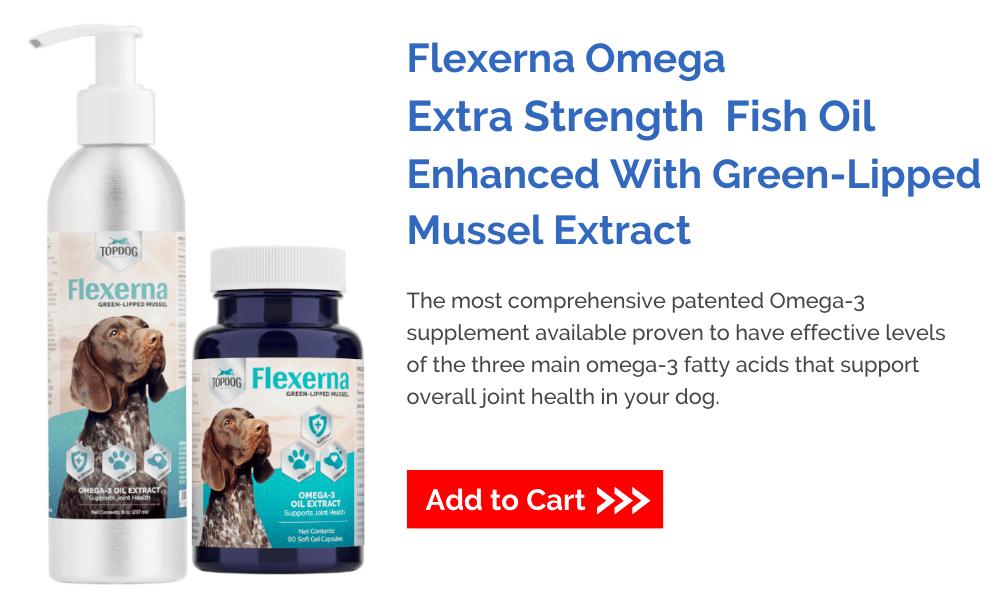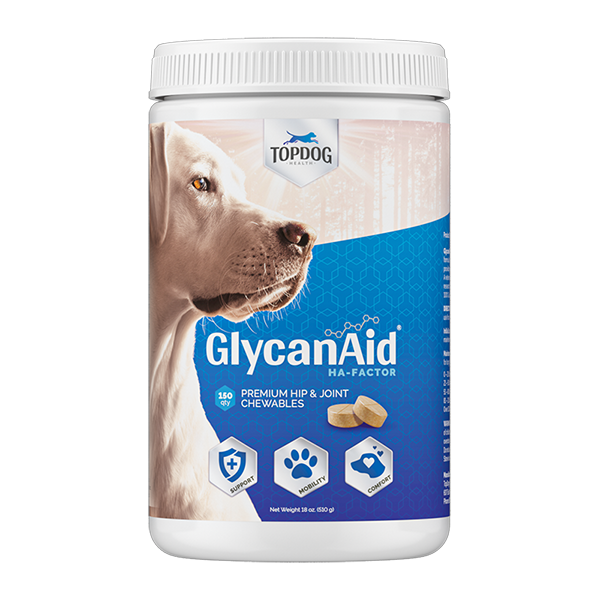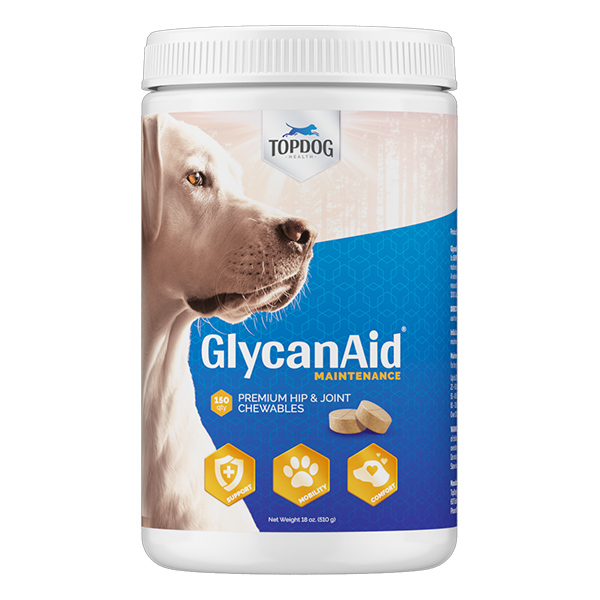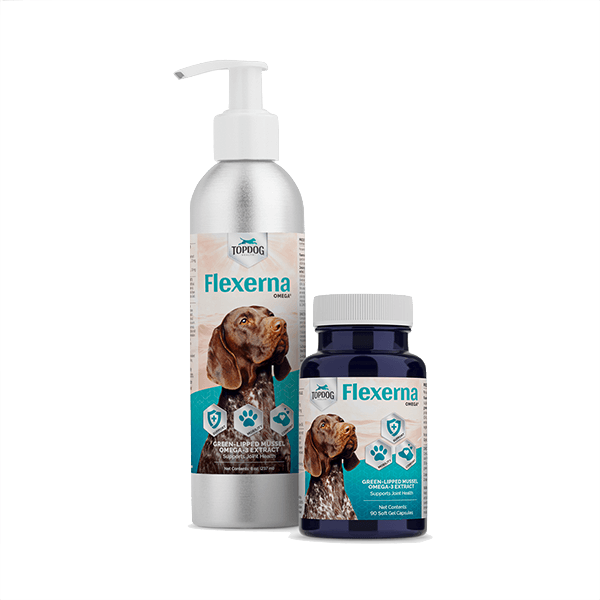Before we go any further, here’s your answer: YES!
Your dog’s health and happiness will benefit hugely from the simple addition of an omega supplement to their diet. It will promote heart health, reduce discomfort from chronic inflammatory conditions like arthritis, help soothe skin diseases, promote brain function, and more. And who doesn’t want that for their beloved pet? Now, let’s get into the details…
What Are Omegas?
Most of us have heard that omega fatty acids are good for us (and our dogs), but many people’s knowledge doesn’t go much further than that. To give a quick overview, there are two kinds of fatty acids: essential and non-essential. Your dog’s body is able to produce the non-essential ones on its own, so we’ll skip those for now.
The essential fatty acids must be derived from food sources, however, and there are two kinds: omega-3s and omega-6s. In general, most dogs have an imbalance of the ideal ratio of omega-6 to omega-3, mainly because omega-6 sources are cheaper and more readily available for pet food manufacturers. The most effective way to remedy this imbalance is to provide your dog an omega-3 supplement.
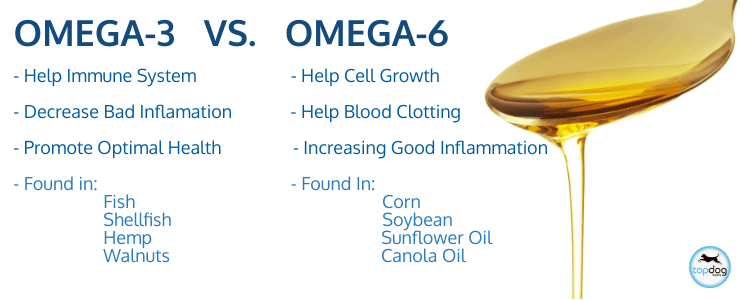
Why Does My Dog Need an Omega-3 Supplement?
The magic of omega-3s lies in their ability to reduce inflammation. Low-grade chronic inflammation is at the root of countless diseases (think arthritis, heart disease, and even cancer), and omega-3 supplements help keep this in check. If you think your pet isn’t at risk for such diseases, keep in mind that being overweight is one of the highest causes of low-grade chronic inflammation, and more than half of all dogs in the U.S. are overweight (let that one sink in for a minute…). In addition to omega-3s being a wonderful preventative measure, they’re also a great way to help with discomfort when inflammatory symptoms (like stiff joints in older dogs) begin to occur.
Another important thing to understand is there also needs to be a balance between omega-3s and omega-6s in your dog’s body. Although they sound similar and both help to control hormones, they perform somewhat opposite roles. Omega-6 fatty acids produce hormones that assist with cell growth, blood clotting, and increasing inflammation as part of the immune response (the good acute kind of inflammation that promotes healing, i.e. when your ankle swells up after a sprain). Omega-3 fatty acids, on the other hand, produce hormones that help the immune system, decrease inflammation (the harmful low-grade chronic inflammation that leads to disease), and work alongside omega-6 in such a way to maintain optimal health.
Remember, most dogs who eat a commercial diet (read: kibble and/or canned food) will have an imbalance of omegas. This is because omega-6 fatty acids, which are high in sources such as corn, soybean, safflower, sunflower, and canola oil, are usually cheaper and more readily available than omega-3 fatty acid sources such as fish, shellfish, hemp, and walnuts. Remedying this imbalance with an omega-3 supplement will help ensure a healthy immune system, heart, and brain. This is why a good balance of both is so essential.
What Are the Benefits of Omega-3 Supplements?
Now that we understand why omega-3 supplements are so important, let’s get into the benefits you’ll actually see by giving one to your pup.
1. Help Reduce Joint Inflammation
All omega-3 fatty acids have the ability to reduce chronic inflammation by blocking the enzymes (lipoxygenase and cyclooxygenase) that contribute to it. The most well-known are DHA and EPA, which are found in fish oil supplements. ETA, which is an additional omega-3 found in green lipped mussel oil supplements, is a rare form that goes one step further: it actually works at the gene level to lower the production of cyclooxygenase. This means less joint inflammation, less pain, and more mobility for your canine companion.
2. Support Heart Health
Giving your dog an omega-3 supplement may lower their chances of developing atrial fibrillation (AKA irregular heart rhythm), as well as reduce their risk of heart problems. It may also decrease their cholesterol and triglyceride levels, help maintain a healthy blood pressure, and reduce their risk of stroke or other heart-related problems.
3. Increase Brain Function
Omega-3 supplementation can also support your dog’s brain health. Studies suggest that supplementing dogs with omega-3s can help with cognitive function and memory – especially in older dogs – such as improving recognition of family members and other household pets. DHA is also important in brain and eye development in puppies, which means giving an omega-3 supplement to pregnant or nursing dogs can benefit their babies.
4. Promote Skin and Coat Health
Omega-3 fatty acids are especially helpful for dogs that suffer from skin disorders. A daily supplement can ease irritating inflammation due to allergies, reduce itchy skin and the occurrence of yeast infections, and even eradicate dandruff. It can also be an effective way to potentially decrease the incidence of hot spots on your pup. All this means a healthier, shinier coat as well.
5. Improve Health When Dealing with Chronic Disease
With their immune-boosting and inflammation-fighting effects, omega-3s can reduce painful symptoms caused by chronic disease in your dog. Omega-3 supplements been shown to help dogs who suffer from arthritis, heart disease, kidney disease, inflammatory bowel disease, and dermatitis, and can even be helpful in preventing the spread of certain cancers.
The Bottom Line
With all the benefits of an omega-3 supplement, it’s hard to argue that your dog doesn’t need one. Plus, it’s so simple and takes just seconds each day to provide. If your dog is suffering from a chronic inflammatory disease like arthritis, you’re providing them welcome relief.
If your pup is healthy, you’re helping ensure they enjoy as much time as possible free from disease and discomfort.
Plus, not only are you looking after your beloved pet, you’re actually doing yourself a favor as well. When your canine companion is happy and healthy, it means less vet bills, more adventures together, and ample time to enjoy the special bond you share with man’s best friend.
